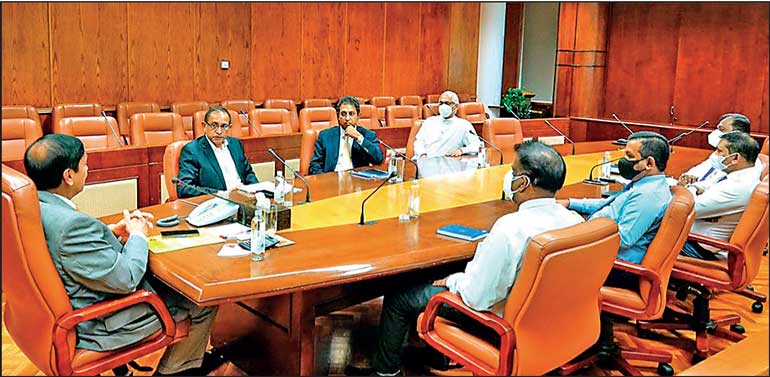Sunday Feb 15, 2026
Sunday Feb 15, 2026
Thursday, 10 March 2022 00:25 - - {{hitsCtrl.values.hits}}

The main Opposition Samagi Jana Balawegaya (SJB) firebrand economists and MPs trio met Central Bank Governor Nivard Cabraal to find out first-hand the on-going foreign exchange and debt crisis as well as to reiterate their recommendations.
The move by SJB trio MP Kabir Hashim, Dr. Harsha de Silva and Eran Wickramaratne (also members of the party’s Economic Centre) was historic for an Opposition party and reflected a proactive stance
on their part.
Following the meeting Dr. de Silva tweeted that they discussed the country’s ability to pay for imports and foreign debt and exchange rates as well as, soaring inflation and financial system stability with the debt moratorium ending.
Harsha said CBSL is still looking at the crisis as a liquidity short term one. “Getting a swap here and there, postponing the ACU payments etc., as opposed to a liquidity, plus a solvency issue that also requires analysis of the sustainability of the foreign debt and a restructure,” he said.
He opined CBSL doesn’t seem to be considering an IMF supported debt restructuring.
SJB MP said Cabraal was talking about paying $ 1 billion July bond etc., and said they proposed eight points to Finance Minister Basil Rajapaksa and waiting.
“Looks like the Sri Lanka crisis will prolong. Huge governance failure. Kicking can down road,” Harsha said in his tweet.
According to him, SJB proposed urgent debt sustainability analysis and a plan to restructure debt. “We proposed to engage with the IMF and told them to seriously consider the shock of the pandemic-moratorium’s ending; how banks and businesses will deal with it. Should consider some assistance,” Harsha said.
Eran Wickramaratne said as the Government didn’t allow the Central Bank to operate independently inflation went up and the crises exacerbated.
He said the CBSL failed in its two main responsibilities of controlling inflation and maintaining the stability of the financial system.
The SJB MP Wickremaratne warned the Government that if the Central Bank was not allowed to maintain its independence as envisaged in the Monetary Law Act, and does not adopt a proper system to control inflation and financial stability, the commodity prices will continue to rise to unaffordable levels.
He said the meeting discussed the Central Bank’s policies and the problems faced by the people as a result of rising commodity prices and the shortage of essential goods and services due to the dollar crisis.
Wickramaratne further elaborating on their discussions with CBSL Governor and the senior officials said that:
The Opposition and economic experts from the very beginning alerted that this Government is pursuing wrong policies, and as a result, the country would face even more crises if the central bank did not adopt the right approach for controlling inflation.
He said that he was not satisfied with the method adopted by the Central Bank to control commodity prices and that the main reason that led to this deteriorating situation was that the Central Bank did not act independently.
“We pointed out the current shortcomings of the Central Bank and made positive comments in this regard. The Yahapalana Government amended the Monetary Law Act to enable the Central Bank to discharge its key responsibilities independently,” said Wickramaratne
Wickremaratne said that the trio of the Economic centre of the Opposition SJB drew the attention of the Central Bank officials that with the proper implementation of the Monetary Law Act, further increase in commodity prices could be curtailed.
When we drew their attention to the second responsibility of maintaining financial stability, the officials gave a patient hearing to our suggestions. We were also informed about the introduction of a method of systematic removal of moratorium loan grace periods given to people from different walks of life as they have taken different loans due to situations that went beyond their control.
It is the responsibility of the Central Bank as well as the Government to protect the businesses of the country by providing relief to the businessmen who are unable to repay their loans due to circumstances beyond their control. If the debt relief period is not extended the country will have to face another crisis.
Wickramaratne urged that a program should also be implemented to provide relief to the poor and low-income earners who are suffering due to various crises that followed the dollar crisis in the country today. Crisis on the part of the Government, such as printing money, declining production, and shortage of goods, has increased the pressure on the poor.
Wickremaratne said the Government should take the responsibility for providing relief to the people as the Central Bank, which has a regulatory responsibility to control inflation, has failed in its responsibility and that led to the shortage of dollars, goods and the rise in prices.